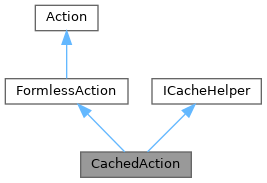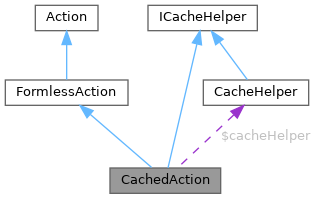Abstract action class with scaffolding for caching HTML and other values in a single blob. More...


Public Member Functions | |
| addCachedHTML ( $computeFunction, $args=[], $key=null) | |
| Add some HTML to be cached. | |
| getCachedValue ( $computeFunction, $args=[], $key=null) | |
| Get a cached value if available or compute it if not and then cache it if possible. | |
| onCacheInitialized ( $hasCached) | |
| Gets called after the cache got initialized. | |
| saveCache () | |
| Saves the HTML to the cache in case it got recomputed. | |
| setCacheEnabled ( $cacheEnabled) | |
| Sets if the cache should be enabled or not. | |
| setExpiry ( $cacheExpiry) | |
| Sets the time to live for the cache, in seconds or a unix timestamp indicating the point of expiry. | |
| startCache ( $cacheExpiry=null, $cacheEnabled=null) | |
| Initializes the caching. | |
 Public Member Functions inherited from FormlessAction Public Member Functions inherited from FormlessAction | |
| onView () | |
| Show something on GET request. | |
| show () | |
| The main action entry point. | |
 Public Member Functions inherited from Action Public Member Functions inherited from Action | |
| __construct (Page $page, IContextSource $context=null) | |
| Constructor. | |
| addHelpLink ( $to, $overrideBaseUrl=false) | |
| Adds help link with an icon via page indicators. | |
| doesWrites () | |
| Indicates whether this action may perform database writes. | |
| getContext () | |
| Get the IContextSource in use here. | |
| getLanguage () | |
| Shortcut to get the user Language being used for this instance. | |
| getName () | |
| Return the name of the action this object responds to. | |
| getOutput () | |
| Get the OutputPage being used for this instance. | |
| getRequest () | |
| Get the WebRequest being used for this instance. | |
| getRestriction () | |
| Get the permission required to perform this action. | |
| getSkin () | |
| Shortcut to get the Skin being used for this instance. | |
| getTitle () | |
| Shortcut to get the Title object from the page. | |
| getUser () | |
| Shortcut to get the User being used for this instance. | |
| msg () | |
| Get a Message object with context set Parameters are the same as wfMessage() | |
| requiresUnblock () | |
| Whether this action can still be executed by a blocked user. | |
| requiresWrite () | |
| Whether this action requires the wiki not to be locked. | |
Protected Member Functions | |
| getCacheKey () | |
| Returns the variables used to constructed the cache key in an array. | |
 Protected Member Functions inherited from Action Protected Member Functions inherited from Action | |
| checkCanExecute (User $user) | |
| Checks if the given user (identified by an object) can perform this action. | |
| getDescription () | |
| Returns the description that goes below the \<h1\> tag. | |
| getPageTitle () | |
| Returns the name that goes in the \<h1\> page title. | |
| setHeaders () | |
| Set output headers for noindexing etc. | |
| useTransactionalTimeLimit () | |
| Call wfTransactionalTimeLimit() if this request was POSTed. | |
Protected Attributes | |
| bool | $cacheEnabled = true |
| If the cache is enabled or not. | |
| CacheHelper | $cacheHelper |
| CacheHelper object to which we forward the non-SpecialPage specific caching work. | |
 Protected Attributes inherited from Action Protected Attributes inherited from Action | |
| $context | |
| IContextSource if specified; otherwise we'll use the Context from the Page. | |
| $fields | |
| The fields used to create the HTMLForm. | |
| $page | |
| Page on which we're performing the action. | |
Additional Inherited Members | |
 Static Public Member Functions inherited from Action Static Public Member Functions inherited from Action | |
| static | exists ( $name) |
| Check if a given action is recognised, even if it's disabled. | |
| static | factory ( $action, Page $page, IContextSource $context=null) |
| Get an appropriate Action subclass for the given action. | |
| static | getActionName (IContextSource $context) |
| Get the action that will be executed, not necessarily the one passed passed through the "action" request parameter. | |
Detailed Description
Abstract action class with scaffolding for caching HTML and other values in a single blob.
Before using any of the caching functionality, call startCache. After the last call to either getCachedValue or addCachedHTML, call saveCache.
To get a cached value or compute it, use getCachedValue like this: $this->getCachedValue( $callback );
To add HTML that should be cached, use addCachedHTML like this: $this->addCachedHTML( $callback );
The callback function is only called when needed, so do all your expensive computations here. This function should returns the HTML to be cached. It should not add anything to the PageOutput object!
Definition at line 46 of file CachedAction.php.
Member Function Documentation
◆ addCachedHTML()
| CachedAction::addCachedHTML | ( | $computeFunction, | |
$args = [], |
|||
$key = null |
|||
| ) |
Add some HTML to be cached.
This is done by providing a callback function that should return the HTML to be added. It will only be called if the item is not in the cache yet or when the cache has been invalidated.
- Since
- 1.20
- Parameters
-
callable $computeFunction array $args string | null $key
Definition at line 135 of file CachedAction.php.
References $args, $html, and Action\getOutput().
◆ getCachedValue()
| CachedAction::getCachedValue | ( | $computeFunction, | |
$args = [], |
|||
$key = null |
|||
| ) |
Get a cached value if available or compute it if not and then cache it if possible.
The provided $computeFunction is only called when the computation needs to happen and should return a result value. $args are arguments that will be passed to the compute function when called.
- Since
- 1.20
- Parameters
-
callable $computeFunction array | mixed $args string | null $key
- Returns
- mixed
Implements ICacheHelper.
Definition at line 119 of file CachedAction.php.
References $args.
◆ getCacheKey()
|
protected |
Returns the variables used to constructed the cache key in an array.
- Since
- 1.20
- Returns
- array
Definition at line 169 of file CachedAction.php.
References Action\getLanguage(), Action\getName(), and page.
Referenced by startCache().
◆ onCacheInitialized()
| CachedAction::onCacheInitialized | ( | $hasCached | ) |
Gets called after the cache got initialized.
- Since
- 1.20
- Parameters
-
bool $hasCached
Definition at line 184 of file CachedAction.php.
References Action\getOutput().
◆ saveCache()
| CachedAction::saveCache | ( | ) |
Saves the HTML to the cache in case it got recomputed.
Should be called after the last time anything is added via addCachedHTML.
- Since
- 1.20
Implements ICacheHelper.
Definition at line 146 of file CachedAction.php.
◆ setCacheEnabled()
| CachedAction::setCacheEnabled | ( | $cacheEnabled | ) |
Sets if the cache should be enabled or not.
- Since
- 1.20
- Parameters
-
bool $cacheEnabled
Implements ICacheHelper.
Definition at line 71 of file CachedAction.php.
References $cacheEnabled.
◆ setExpiry()
| CachedAction::setExpiry | ( | $cacheExpiry | ) |
Sets the time to live for the cache, in seconds or a unix timestamp indicating the point of expiry.
- Since
- 1.20
- Parameters
-
int $cacheExpiry
Implements ICacheHelper.
Definition at line 158 of file CachedAction.php.
◆ startCache()
| CachedAction::startCache | ( | $cacheExpiry = null, |
|
$cacheEnabled = null |
|||
| ) |
Initializes the caching.
Should be called before the first time anything is added via addCachedHTML.
- Since
- 1.20
- Parameters
-
int | null $cacheExpiry Sets the cache expiry, either ttl in seconds or unix timestamp. bool | null $cacheEnabled Sets if the cache should be enabled or not.
Implements ICacheHelper.
Definition at line 84 of file CachedAction.php.
References $cacheEnabled, getCacheKey(), and Action\getRequest().
Member Data Documentation
◆ $cacheEnabled
|
protected |
If the cache is enabled or not.
- Since
- 1.20
Definition at line 63 of file CachedAction.php.
Referenced by setCacheEnabled(), and startCache().
◆ $cacheHelper
|
protected |
CacheHelper object to which we forward the non-SpecialPage specific caching work.
Initialized in startCache.
- Since
- 1.20
Definition at line 55 of file CachedAction.php.
The documentation for this class was generated from the following file:
- includes/actions/CachedAction.php